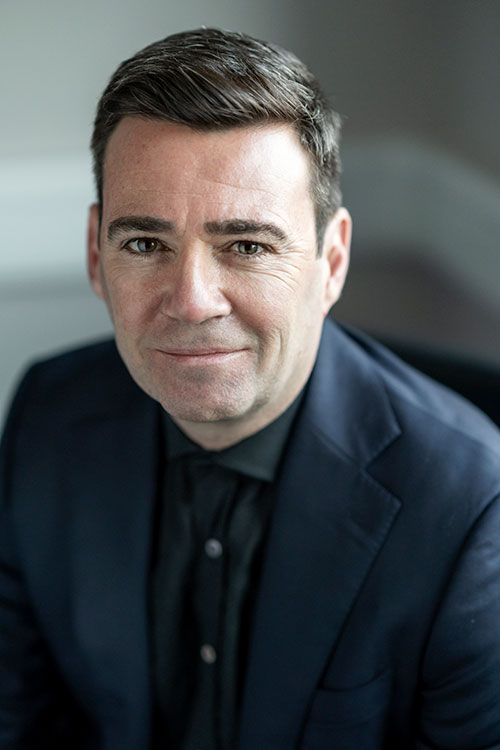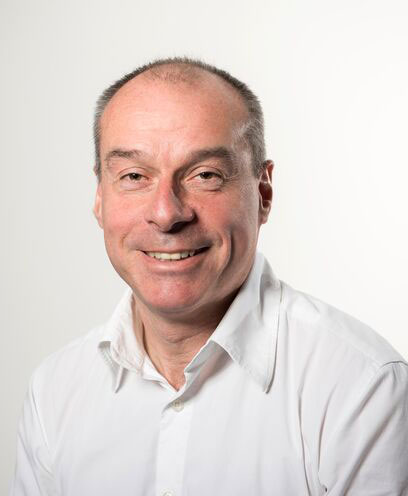
Metro mayors in England are directly elected leaders who oversee a city and metropolitan area. The idea is to make decisions closer to the people affected by them. Depending on the devolution agreement, metro mayors play a role in determining transport, planning, policing, housing and health policy for their area.
GP Frontline spoke to Andy Burnham, Mayor of Greater Manchester, and Dr Tom Coffey, health advisor to London Mayor Sir Sadiq Khan, about health policy and their ambitions for general practice.

Greater Manchester
Andy Burnham has been the Mayor of Greater Manchester since 2017. He also served as Secretary of State for Health in Gordon Brown’s government from 2009-2010.
Looking back on his time as Health Secretary he notes how things have changed over the decades, “I think back to those days, and we were looking at things through a purely medical model. I’m not sure that was completely right then, but it’s certainly not right now.”
He says this change is particularly noticeable in primary care. “General practice has become a service that is helping people at a range of levels, not just dealing with medical needs, but social as well.
“I believe general practice needs and wants to break out of the overly medical model and think about the whole person holistically, and the overlapping physical, mental, social needs that patients have,” he says.
Andy wants GPs to be freed up to support people in the community in which they’re based, saying some of the best innovative work he has seen has come from GPs working with their community, taking all the factors that can affect someone’s health into account.
“We need more of that - to let reform be driven from the bottom up, rather than imposed down from the top.”
He’s particularly enthusiastic about the Government’s commitment to a shift from sickness to prevention.
“A preventative model will allow GPs to focus on the appointments for those who really need them, rather than fielding through the 8am rush every morning. General practice is at the heart of a prevention service, and the heart of a system to help residents live well.”
He explains how Greater Mancher acts as a ‘prevention demonstrator’, showcasing what can be achieved when focus is placed on preventative medicine delivered close to home.
“I see amazing things happening across Greater Manchester, but what we’ve got to do is take those learnings, make them the norm and support our colleagues in primary care to make them sustainable.”
He points to local examples of work that are delivering strong results for patients, including Healthy Hyde, a primary care network which has been piloting a scheme to help patients into work through coaching and wraparound support.
He also highlights the Shared Health Foundation, which takes a ‘deprivation driven’ approach, recognising that deprivation might be behind the symptoms that people are presenting with to their GP.
“In my view, that’s the right way of working – it’s about freeing people up to really focus on the person in front of them and support them in different ways, and to have that ability to refer into a wider public service and community system on the doorstep of primary care. I see real innovation, and it’s not the norm, but it needs to become it,” he said.
He sees Greater Manchester’s role of ‘prevention demonstrator’ as an opportunity for GPs, “Let’s not fight the same battles, it’s time to work together towards a more sustainable future. I think it’s achievable, I really do, but we’ll only get there if we all face in the same direction.”
Andy wants Greater Manchester to charter a path towards a different model of primary care, and an integrated way of working at a local level. He hopes that a ‘live well’ service can sit alongside the NHS, with GPs and primary care staff heavily involved in care being delivered predominantly through hyperlocal community-based organisations.
“In this approach, a GP receptionist would be able to refer relevant patients to the ‘live well’ service, knowing they might benefit from that first, and that will inevitably free up more GP resource. That’s the system we’re trying to build, one where we can help take the pressure off the shoulders of GPs, the receptionists, and other clinical staff within primary care.”
When asked for his key message to GPs, he says: “We know how hard what you’re dealing with is and that you’re battling day in, day out. But you’re not battling it alone. The pressure that you’re under, we see it, and more than that – we’re thinking about solutions.”

London
Dr Tom Coffey is Health Advisor to Mayor of London Sir Sadiq Khan. He’s also a working GP in London and sees how deeply Londoners' health is shaped by the conditions in which they live.
“When I see a patient with asthma it reminds me that health is also shaped by the air they breathe, the home they live in, the wages they earn, and the opportunities they have to stay active without triggering symptoms,” he says.
“It's not just what happens inside the clinic that makes a difference to health – it's very much our wider environment. That's why Sadiq Khan has made clean air, affordable housing, good jobs, and access to green spaces central to his agenda – he’s taking a ‘health in all policies’ approach to everything.”
Tom stresses that while the Mayor has no commissioning or operational powers over the NHS, he can influence the wider factors that shape Londoners' health, long before illness takes hold.
Throughout his Mayoralty, he says Sir Sadiq has worked closely with partners across the health and care system - and beyond - to tackle the root causes of ill health, and ultimately ease pressures on the health service, including on GPs.
Tom points to the expansion the Ultra Low Emission Zone (ULEZ) that has helped reduce toxic emissions into the air, as a key success. Another is the Universal Free School Meals programme for every state primary school child, regardless of background, and the Healthy Schools and Healthy Early Years awards programmes, which tackle health inequalities by promoting good nutrition, oral and physical health and childhood cognitive development.
He also highlights policy interventions on the London transport network that have reduced Londoners’ exposure to junk-food adverts.
But he knows there is more to do, which is why the Mayor’s new Health Inequalities Strategy Implementation Plan (2025-2028), plans to use levers across government – from housing and transport to creating more jobs – to make London healthier.
As a GP himself, Tom is more than aware of the years of inadequate funding, increasing workload and poor workforce planning faced by general practice.
“The challenge for us as GPs isn’t just helping people get better but doing so within a system strained by years of underfunding. That pressure makes it harder to deliver the high-quality care and support patients deserve,” he says.
He believes general practice needs sustained long term planning to ensure that workload and workforce match the needs of Londoners, focusing on access and promoting continuity of care.
He’s pleased to see the three shifts in the NHS 10 Year Health Plan, which he says will be ‘essential’ if the NHS is to ‘move beyond managing crisis to helping individuals and communities truly thrive.’
“I personally look forward to seeing how GP teams – who are already at the heart of their communities – will be enabled to add value as part of the new ‘neighbourhood teams’.
“Shifting more healthcare into communities brings care closer to where people live, makes it easier to reach those who might not otherwise engage with traditional services, and allows prevention and early support to be tailored to local needs.
“But improving health in a city of around nine million people can’t be achieved by hospitals and GPs alone. For example, London has one of the lowest vaccination uptakes in the country. Our work during the Covid pandemic demonstrated that when communities themselves are involved in their health, you get increased trust in the health service.
He highlights work to tackle persistent health inequalities in the capital – including how City Hall, Transport for London, Santander Cycles, Tower Hamlets GP Care Group and the charity Bikeworks have launched a new initiative in Tower Hamlets to boost wellbeing through cycling.
He thinks social prescribers have a key role to play, working with GPs, to connect people in the community with activities that support their mental and physical health.
“It’s a powerful step in the right direction for preventative care and community wellbeing, and this type of partnership work is essential to building a health and care system that truly meets Londoners’ needs.”
He believes that GPs’ ability to deliver the best care is strengthened when the wider environment supports wellbeing, reducing the need for urgent care in the first place.
“But this requires everyone across the system coming together – not just GPs – to create a city that supports good health. Doing this is only possible through partnerships across national and local government, voluntary sector, communities, business, and more. When these pieces are in place, GPs can focus on what they do best – delivering patient-centred care,” he says.
The RCGP reached out to Metro Mayors of other political parties around the country, but they were unable to contribute before publication.
Thank you for your feedback. Your response will help improve this page.
